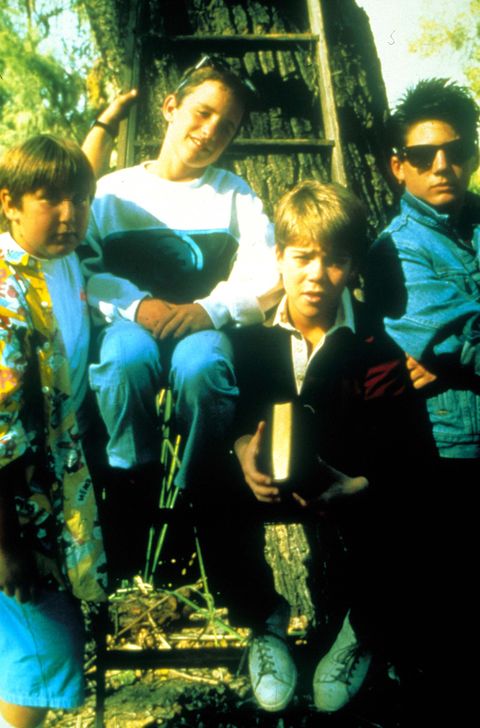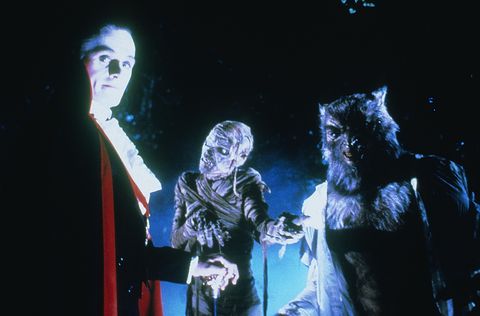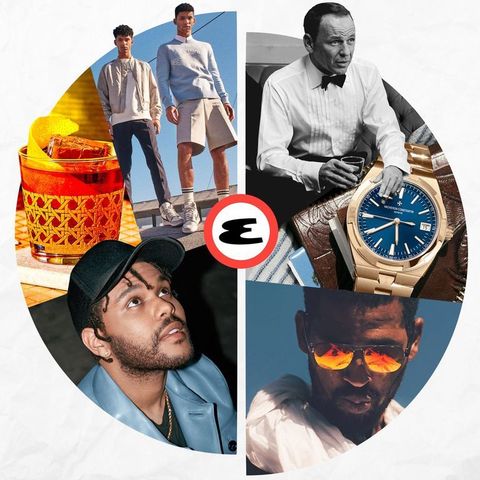If you’re really into movies, I mean really into movies, Halloween can be a lot of pressure. Every year, from the moment I first spot all of the black-and-orange Fun Size bags of candy at the supermarket, I start obsessing over which movie I’m going to watch after the final doorbell rings on October 31st. In recent years, I’ve gone with some obvious ones (An American Werewolf in London, Re-Animator, Dawn of the Dead) and some not-so-obvious ones (Goodnight Mommy, Tombs of the Blind Dead, A Nightmare on Elm Street 3: Dream Warriors). But for some reason, my decision this year was surprisingly easy. It just came to me: The Monster Squad.
Let me explain the process. First off, I knew that I didn’t want anything too gruesome. It’s not that I’ve lost my tolerance for guts and gore as I’ve gotten older. I can still get down with a Fangoria splatter-fest with the best of them. But I also have seven-year-old twin boys who have a habit of sneaking downstairs in the middle of the night for absolutely no reason. Their tiny little feet are like super-stealth weapons of surprise. They’re goddamned ninjas is what they are. Second, like a lot of people, the pandemic has put me in a pretty nostalgic place, where all I seem to crave is comfort food whether it’s TV shows, music, or books. My 2020 mantra has been: No heavy lifting. Which is exactly what The Monster Squad delivers. It’s got that whole scary-but-not-too-scary Hardy Boys, Little Rascals, suburban kid-sleuth vibe that feels lifted from the pages of the ‘80s Amblin playbook. And it’s simultaneously the rare B-movie that knows it’s a B-movie and wears that label like a badge of honor rather than a scarlet letter. So there you go. Done and done.
Now, if you missed out on The Monster Squad the first time around back in the summer of 1987, you’re not alone. The movie tanked. In fact, it barely managed to eke out $3 million at the box office back in 1987, which, when adjusted for inflation, is, I don’t know exactly, but it’s still pretty bad. The tween-age horror comedy’s death was both quick and painless. Unless, of course, you were Shane Black or Fred Dekker—the roommates and recent college grads who cowrote the film (Dekker also directed). For them, it wasn’t painless at all—but more about the Black & Dekker team in a bit.
This content is imported from YouTube. You may be able to find the same content in another format, or you may be able to find more information, at their web site.
What’s most interesting about The Monster Squad is how this little things-that-go-bump-in-the-night story about a group of middle-school pals out to stop a menagerie of infamous bogeymen (Dracula, the Mummy, the Wolfman, Frankenstein’s Monster, and The Creature from the Black Lagoon’s Gill-Man) has been resurrected and embraced in recent years. It’s gone from being a dead-and-buried Reagan-era relic to a genuine beloved cult classic. So much so that a few years back, Michael Bay’s production company flirted with a remake before eventually pulling the ripcord. There’s even a 2018 documentary about the film’s rabid fanbase called Wolfman’s Got Nards, directed by The Monster’s Squad’s now-grown kid star, Andre Gower.
To be clear, The Monster Squad isn’t any scarier than your average Harry Potter film. But it’s certainly a lot more charming due to its rough edges. Plus, if you’re a devotee of Universal’s classic black-and-white monster movies of the ‘30s, ‘40s, and ‘50s, it’s an affectionate, Van Helsing Lite tip of the hat to those gems. Granted, Duncan Regehr’s Dracula in the film is no Bela Lugosi (and he’s certainly no Christopher Lee—the greatest of all movie Draculas by a mile). But thanks to Stan Winston’s make-up handywork, it’s a bit like watching, if you’ll pardon the expression, the dead coming back to life. Meanwhile, the movie’s cast of pint-sized vampire slayers actually seem like real kids. They’re not precocious or hammy and there isn’t a Corey (Feldman or Haim) in the bunch. They feel like real kids who just happen to fashion stakes in woodshop and melt down their parents’ cutlery to make silver bullets so they can literally face down their demons. How The Goonies or The Lost Boys was a hit and this thing wound up in the Blockbuster remainder bin back in the ‘80s is a mystery to me.

Moviestore/Shutterstock
I suppose it didn’t help that the critics at the time dogpiled on the film pretty mercilessly. From his perch at The New York Times, Vincent Canby wrote that The Monster Squad was “a silly attempt to crossbreed an Our Gang comedy with a classic horror film, which usually means that both genres have reached the end of the line.” He added, “The comedy is cheerless. The performances are either inept or unlovably coy” and that it “looks like a feature-length commercial for a joke store that sells not-great, rubber monster masks.” Over at The Washington Post, Hal Hinson was even less impressed. Playing off the Black & Dekker pun, he wrote that the movie “plays like it was written with a power tool.”
When Black and Dekker wrote the script, they had just graduated from UCLA. They were living together in a crappy stucco bungalow in West Los Angeles along with a bunch of other hungry wannabe screenwriters. Located at 2310 Parnell Avenue, their home came to be known as the Pad O’ Guys. It was like a frat house for film nerds with a neon “Open 24 Hours” sign in the front window. And the guys who lived there (and they were all guys) could often be found either watching old movies with pizza boxes on their laps or making home-made action movies on the front lawn at three in the morning. During Black and Dekker’s time there, they split the rent with such future screenwriting luminaries as Ed Solomon (Bill & Ted’s Excellent Adventure), David Silverman (The Simpsons), Robert Reneau (Demolition Man), and David Arnott (The Adventures of Ford Fairlane). David Fincher would often drop in.

Hyams/Taft/Barish/Kobal/Shutterstock
Dekker was one of the first to hit pay dirt. A horror comedy script he’d written was turned into 1985’s House, and he would write and direct 1986’s Night of the Creeps. Black, on the other hand, was starting to give up hope. He’d convinced his parents to bankroll him for a year to see if he could make a go of it as a professional screenwriter. And time was almost up. The first script he’d written was called Shadow Company, about a bunch of MIA Vietnam soldiers whose bodies are returned home where they unleash hell as zombies. John Carpenter actually optioned it, but then nothing happened. Then he began writing an action-comedy about a pair of odd-couple L.A. cops. Halfway through, he threw it in the trash. Two days later, he dug it back out and finished it. The script was called Lethal Weapon. Dekker helped his pal find an agent, who sold the script to Warner Bros. for $250,000. Black was 22.
That’s when Black and Dekker sat down at the typewriter together. Both had grown up obsessed with monster movies, comic books, and pulpy detective novels. They channeled all of those influences into The Monster Squad. For Black, who would go on to become the hottest (and most well-remunerated) spec-script writers of the era thanks to The Last Boy Scout ($1.75 million) and The Long Kiss Goodnight ($4 million), and later the director of Kiss Kiss Bang Bang, Iron Man 3, and The Nice Guys, the process would end up being the happiest of his career. When I interviewed him back in 2004, he said, “I’m not kidding when I say this, The Monster Squad was the purest script I ever did, with the least amount of self-consciousness and the most passion. It was my best script.”
Watching the movie now, 33 years after the withering reviews and swift box-office execution, you can still see that joy in every frame. And while it may not be an obvious Halloween go-to like The Exorcist or The Texas Chain Saw Massacre or…Halloween, it’s the movie I’m going with this year. No regrets, no second thoughts. And if, by chance, my kids happen to come downstairs in the middle of it, I may just wave them over and let them sit on the couch next to me so they can watch a kid who’s not that much older than them kick the Wolfman in the nards. I’m pretty sure they’ll think that’s fucking hilarious.
Chris Nashawaty
Chris Nashawaty is a writer, editor, critic, and author of books about Roger Corman & Caddyshack.
This content is created and maintained by a third party, and imported onto this page to help users provide their email addresses. You may be able to find more information about this and similar content at piano.io

